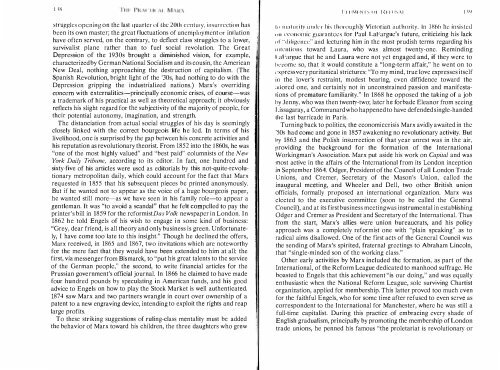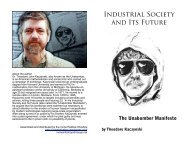CONTENTS - ouroboros ponderosa
CONTENTS - ouroboros ponderosa
CONTENTS - ouroboros ponderosa
You also want an ePaper? Increase the reach of your titles
YUMPU automatically turns print PDFs into web optimized ePapers that Google loves.
I IH<br />
struggles opening on the last quarter ur (he 20lh century. iJlsurrection has<br />
been its own master; the great Iluctuations of unemployment or inflation<br />
have often served, on the contrary, to denect class struggles to a lower,<br />
survivalist planc rather than to fuel social revolution. The Great<br />
Depression of the 1930s brought a diminished vision, for example,<br />
characterized by German National Socialism and its cousin, the American<br />
New Deal, nothing approaching the destruction of capitalism. (The<br />
Spanish Revolution, bright light of the '30s, had nothing to do with the<br />
Deprcssion gripping the industrialized nations.) Marx's overriding<br />
concern with externalities-principally economic crises, of course-was<br />
a trademark of his practical as well as theoretical approach; it obviously<br />
rellects his slight regard for the subjectivity of the majority of people, for<br />
their potential autonomy, imagination, and strength.<br />
The distanciation from actual social struggles of his day is seemingly<br />
closely linked with the correct bourgeois life he led. In tcrms of his<br />
livelihood, onc is surprised by the gap between his concrete activities and<br />
his reputation as revolutionary theorist. From 1852 into the 1860s, he was<br />
"one of the most highly valued" and "best paid" columnists of the New<br />
York Daily Tribune, according to its editor. In fact, one hundred and<br />
sixty-five of his articles were uscd as editorials by this not-quite-rcvolu<br />
tionary metropolitan daily, which could account for the fact that Marx<br />
requested in 1855 that his subsequent pieces bc printed anonymously.<br />
But if he wanted not to appear as the voice of a huge bourgeois paper,<br />
hc wanted still more-as we have seen in his family role-to appear a<br />
gentleman. It was "to avoid a scandal" that he felt compelled to pay the<br />
printer's bill in 1859 for the reformist Das Volk newspaper in London. In<br />
1862 he told Engels of his wish to engage in some kind of business:<br />
"Grey, dear friend, is all theory and only business is green. Unfortunate<br />
ly, I have come too late to this insight." Though he declined the offers,<br />
Marx received, in 1865 and 1867, two invitations which are noteworthy<br />
for the mere fact that they would have been extended to him at all: the<br />
first, via messenger from Bismarck, to "put his great talents to thc service<br />
of the German people," the second, to write financial articles for the<br />
Prussian government's official journal. In 1866 he claimed to have made<br />
four hundred pounds by speculating in American funds, and his good<br />
advice to Engels on how to play the Stoek Market is well authenticated.<br />
1874 saw Marx and two partners wrangle in court over ownership of a<br />
patent to a new engraving device, intending to exploit the rights and reap<br />
large profits.<br />
To these striking suggestions of ruling-class mentality must be added<br />
the behavior of Marx toward his children, the three daughters who grew<br />
1'.1 I·MI·NT:-. ( >I I'I·I·I I.'\ I I \'1<br />
III 11 \;ll u ri tv Lllukr his t huruughly Victorian authority. In IK()(} he inistu<br />
I'll l'CUIlOll1ic guarantees fo r Paul LaFargue's future, criticizing his lack<br />
,.r ·'diligence" and lecturing him in the most prudish terms regarding his<br />
IIllenti"ns toward Laura, who was almost twenty-one. Reminding<br />
I.al;arguc that he and Laura were not yet engaged and, if they were to<br />
he come so, that it would constitute a "long-term affair," he went on to<br />
'"-'press very puritanical strictures: "To my mind, true love expresses itself<br />
in the lover's restraint, modest bearing, evcn diffidence toward the<br />
adored one, and certainly not in unconstrained passion and manifesta<br />
lions of premature familiarity." In 1868 he opposed the taking of a job<br />
hy Jenny, who was then twenty-two; latcr he fo rbadc Eleanor from seeing<br />
l .issagaray, a Communard who happened to have defended single-handed<br />
Ihc last barricade in Paris.<br />
Turning back to politics, the economicerisis Marx avidly awaited in the<br />
'50s had corne and gone in 1857 awakening no revolutionary activity. But<br />
hy 1863 and the Polish insurrection of that year unrest was in the air,<br />
providing the background for the formation of the International<br />
Workingman's Association. Marx put aside his work on Capital and was<br />
most active in the affairs of the International from its London inception<br />
in September 1864. adger, Prcsident of the Council of all London Tradc<br />
Unions, and Cremer, Secretary of the Mason's Union, called the<br />
inaugural meeting, and Wheeler and Dell, two other British union<br />
offi c ials, formally proposed an international organization. Marx was<br />
elected to the executive committee (soon to be called the General<br />
Council), and at its first business mcetingwas instrumental in establishing<br />
Odger and Cremer as President and Secretary of the International. Thus<br />
from the start, Marx's allies were union hureaucrats, and his policy<br />
approach was a completely reformist one with "plain spcaking" as to<br />
radical aims disallowed. One of the first acts of the General Council was<br />
the sending of Marx's spirited, fraternal greetings to Abraham Lincoln,<br />
that "single-minded son of thc working class."<br />
Other early activities by Marx included the formation, as part of the<br />
International, of the Reform League dedicated to manhood suffrage. Hc<br />
boasted to Engels that this achievement "is our doing," and was equally<br />
enthusiastic when the National Reform League, sole surviving Chartist<br />
organization, applied for membership. This latter proved too much even<br />
for the faithful Engels, who for some time after refused to even serve as<br />
correspondent to the International for Manchester, where he was still a<br />
full-time capitalist. During this practice of embracing every shade of<br />
English gradualism, principally by promoting the membership of London<br />
trade unions, he penned his famous "the proletariat is revolutionary or






